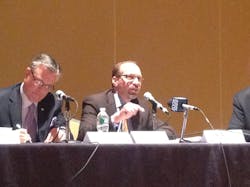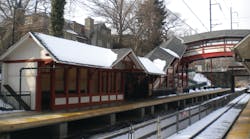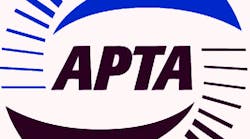Political battles are a common reality for all transit agencies, but new evidence shows the political winds are now gusting at agencies backs.
The American Public Transportation Association released the results of a new survey on June 3 during the Rail Conference in Philadelphia showing 74 percent of those surveyed support using tax dollars for improving public transportation.
With such strong numbers, APTA President and CEO Michael Melaniphy said the results provide strong evidence of broad support for public transit, especially given the number is a 5 percent increase from 2012.
“In most political circles, this kind of support is considered a landslide,” he said.
The survey also showed residents across the nation are jumping behind the support of transit agencies, with 66 percent saying Congress should increase spending on public transit and 80 percent agreeing they agree with the sentiment that transit investment paves the way for better economic development.
In 2012, transit ridership reached 10.5 billion trips, which Melaniphy said is the second highest number since 1957 and of the 62 public transit initiatives put forth last year, 49 were passed, which is nearly an 80 percent passage rate.
“It’s because of great systems across the country like SEPTA, who provide the important benefit of public transportation to our citizens and help keep out local communities economically viable and globally competitive,” Melaniphy said.
Federal Transit Administration Administrator Peter Rogoff said the news of the survey results is welcome news by President Barack Obama’s administration, given transit agency needs are being waged on a two fronts with issues split between upkeep between legacy systems and building new systems in areas where more people are moving.
The issue is pressing because the U.S. is expected to have 100 million more citizens by 2050, Rogoff said, and transit needs will be important to provide the economy to leverage the number of jobs needed to provide for 100 million more people.
However, a more than $50 billion repair backlog currently exists in the U.S. with just the seven largest rail providers, Rogoff said.
“But the fact is this: we lose between 2 and 3 percent of the ridership because of liability problems on our longstanding legacy systems in places like Boston, Washington, Philadelphia, Chicago, San Francisco,” he said. “If we lose just 2 or 3 percent of the riders just because of liability challenges at places like SEPTA, we will more than offset all of the ridership gains that we will enjoy building in new places like Seattle and Salt Lake and Charlotte and Dallas.”
Former Pennsylvania Gov. Ed Rendell was also present at the press conference announcing the release of the survey results and said transit issues are often framed as urban issues, but in reality it’s an issue across the country as smaller agencies are also seeing services cut and hindering opportunities for people to reach jobs.
Prior to the press conference, Rendell also spoke at the morning session of the rail conference where he lambasted political leaders for failing to meet the challenges to address infrastructure issues which had been so important to building the nation. But Rendell used himself as an example that citizens will support spending more if it’s for investing wisely, saying he passed the second-highest tax increase in Pennsylvania history during his first term in office and was still re-elected to office.
“Everybody in the audience, you have to be a warrior for change,” Rendell told the crowd. “We got to convince people back home that it’s worth doing.”

Joe Petrie | Associate Editor
I came to Mass Transit in 2013 after spending seven years on the daily newsbeat in southeastern Wisconsin.
Based in Milwaukee, I worked as a daily newspaper reporter with the Waukesha Freeman from 2006-2011, where I covered education, county and state government. I went on to cover courts for Patch.com, where I was the main courts reporter in the Metro Milwaukee cluster of websites.
I’ve won multiple awards during the course of my career and have covered some of the biggest political events in the past decade and have appeared on national programs.
Having covered local government and social issues, I discovered the importance of transit and the impact it can have on communities when implemented, supported and funded.





